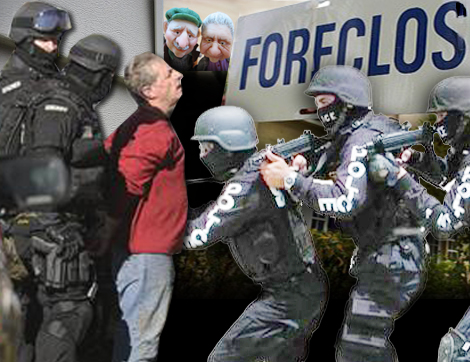
• Sheriff in Colorado uses 22 SWAT officers to enforce court-ordered seizure of family house in default
By Mark Anderson
On October 30, the Clear Creek County, Colorado Sheriff’s Department dispatched 22 Special Weapons and Tactics (SWAT) officers—decked out with military-green helmets and uniforms, fully automatic weapons and numerous other “bells and whistles”—to enforce a court order for a U.S. Bank foreclosure on the home of Sahara Donahue.
The whole affair in Idaho Springs, Colorado lasted some two hours. By 3 p.m. police had cleared the premises, and a moving company soon went in under police escort, removed Ms. Donahue’s personal belongings and left the items at the curb. Police say the court order was signed October 15 by Clear Creek County Judge Rachel J. Olguin-Fersquez.
Ms. Donahue was reportedly accompanied by some 24 protesters who peaceably tried to prevent law enforcement from seizing the home. One protester—according to “intel” police say they gathered—was thought to have an unlicensed handgun, Sheriff Department spokesman Bruce Snelling told AMERICAN FREE PRESS. Ms. Donahue denied this claim.
Pressed by AFP, Snelling added this show of force was justified in the eyes of law enforcement because “at the end of the day, we’re safe”—stressing officer safety is a top priority in modern law enforcement. He also added that the day’s success was measured by the fact that, according to police, no shots were fired by anyone, no one was hurt and there were no arrests, apart from the temporary detainment of two house occupants who were each issued citations for “interference and obstruction” and for which they must appear in court.
“What we have now is government of, by and for the bankers,” says Mickey Paoletta, who runs the Pennsylvania-based Citizens Reform Center and has successfully educated a number of foreclosed people to help them keep their properties. When asked about the Colorado police tactics, he replied, “That’s going on everywhere.” He recalled a scary incident involving a SWAT team foreclosing on a friend in Harrisburg, Pennsylvania in 2001.
“And there are cases in Charlotte, North Carolina, that would make your hair stand up,” added Paoletta, who for years has been dissecting the inner workings of the financial system—including the Federal Reserve System—seeking ways to challenge it in a constructive manner.
Carl E. Person is a Manhattan attorney who works long hours to help people keep their properties in the face of foreclosures. Every day Person gets far more calls from distressed homeowners than he can handle. He observed that the Colorado case is a particularly stark example of what happens all too often in the United States.
“We don’t have a policy of keeping people in their homes,” he said. “We have a policy of selling toxic mortgages to Wall Street and Wall Street owns the defaulted mortgage. Why not keep people in their homes for the same value at which the government is going to sell the property?”
Banks, Person said, should be legally required to faithfully perform fair loan modifications, to lower interest charges and decrease monthly payments, in order to keep people in their homes as a matter of strict social policy—“but the crooks are in charge” and favor vested interests and “they do whatever they want.”
Mark Anderson is AFP’s roving reporter. Listen to Mark’s weekly radio show on the AMERICAN FREE PRESS RADIO NETWORK.

